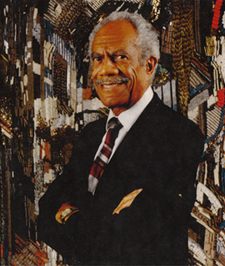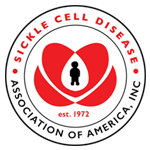
Our first #SCDHistoryHighlight for Black History Month brings attention to the life and work of SCDAA co-founder Dr. Charles F. Whitten. Dr. Whitten was a pediatric hematologist whose dedication to supporting the health of sickle cell patients paved the way for advances in screening, education and more. His pioneering work makes him one of the most important figures in sickle cell history.
Dr. Whitten was born in 1922 in Wilmington, Delaware. He graduated from Howard High School and went on to receive his bachelor’s from the University of Pennsylvania and his medical degree from Meharry Medical College in Nashville, Tennessee. He practiced and studied at many hospitals on the east coast before moving to Detroit, Michigan, to study pediatric hematology under Dr. Wolf Zeltzer. In 1956, he was selected to serve as the clinical director of pediatrics at Detroit Receiving Hospital, becoming the first African American to hold that position.
Dr. Whitten is widely celebrated to this day for his dedication to sickle cell screening. In 1974, he established the Sickle Cell Detection and Information Center in Detroit, Michigan. The center was the most comprehensive community program in the country at the time. During his time at the center, Dr. Whitten educated children and families about sickle cell disease and created color-coded dice (also known as “Whitten Dice”) to teach couples about the genetic risks of the condition.
Prior to founding the Sickle Cell Detection and Information Center, Dr. Whitten practiced medicine for many years as a faculty member of Wayne State University School of Medicine in Detroit, Michigan. Dr. Whitten was dedicated to increasing the representation of African American physicians in the medical field. In 1960, he created the African Medical Education fund alongside Dr. Charles Wright. Nearly a decade later, he implemented Wayne State University’s Post Baccalaureate Enrichment Program to support Black students interested in pursuing medicine.
Dr. Whitten founded the Sickle Cell Disease Association of America of Michigan (SCDAA-MI) in the summer of 1971. That same year, SCDAA-MI joined 14 other community-based organizations at “Wingspread,” a conference center in Racine, Wisconsin, where a vision for a national coordinated approach to addressing issues related to sickle cell disease was unveiled. A year later, Dr. Whitten and Dorothy Boswell formed the National Association for Sickle Cell Disease (now known as SCDAA – National). Dr. Whitten led the organization for nearly 20 years.
SCDAA is grateful to Dr. Whitten for all he did to advance the treatment of sickle cell disease, make medicine more equitable for providers and patients and pave the way for where we are 53 years later. Without his contributions, we would not be where we are today.
Stay tuned next week for our next #SCDHistoryHighlight to learn more!
